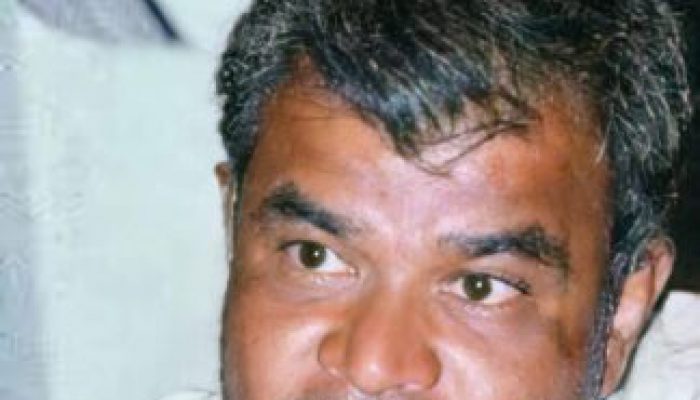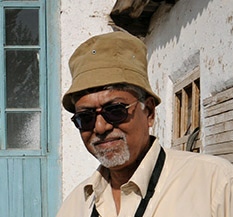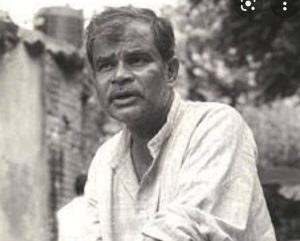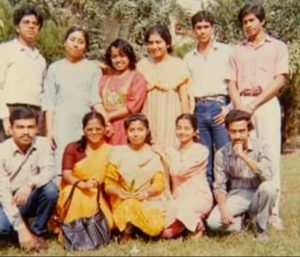(Seeing a scantily dressed woman in the street, an intellectual man has a series of visions, terminating in the birth of a child. LU Xun)
Memories fade with time. Sometime in 1982 Niyogijee asked me to accompany him for a trip to Hoshangabad. “Let’s go and see what Anil Sadgopaljee is doing there”.
I had heard about Kishore Bharati in the seventies during the two Medico Friends Circle meets that I had attended. I was quite eager to visit the place. Spending a couple of days with Niyogijee all by myself was an added incentive.
We did not have a dispensary then. Our job at the time, mine and Binayakda’s, was to go to different muhallas, arrange meetings and talk about our aims and objectives of our health programmes. Most people did not take us seriously though. They did not believe that we were real doctors, as we were not treating patients. That’s why later the same year we started the dispensary. But these meetings gave us a huge dividend. We picked up the health workers, who started participating in our activities and all of them are still working in Shaheed Hospital today.
I gladly accepted Niyogijee’s invitation.
We boarded a train at Durg and had comfortable seats facing each other. It was I think a eight hours journey and we talked about a lot of things, but mainly about our health programmes. Niyogijee was sure that he would get the hospital ready within the next year. I was skeptical about it, knowing the financial condition of the union. But he did build the hospital very next year without any outside financial aid, but that is another story.
He clearly understood my skepticism and said, “Doctor Saab, it is always good to dream of better things. And if you strive hard to fulfil your dreams, then money and other hurdles never become a problem”.
It was probably at Nagpur junction, when Niyogijee pointed out to me a man sitting three or four rows back. That is a policeman in plain clothes who has been following us from Durg and now he will be relieved by someone else, he said. That is what happened. A new person came and sat in his place.
* *
It was Hosangabad station in Madhya Pradesh that we got down from the train and took a bus to take us to Palia Pipariya, where Kishore Bharati had its headquarters.
For those of you who do not know about Kishore Bharati, let me share briefly about it. In 1972, Anil Sadgopal, a scientist, who had resigned from his post of Fellow in Molecular Biology Unit, Tata Institute of Fundamental Research (TIFR), started Kishore Bharati in this remote area with a group of friends, initially to start economic development activities of the region i.e. Bankhedi Block of Hoshangabad District and undertake a Nai Taleem experiment along Gandhian lines.
What finally caught attention of people in India and abroad was the Hoshangabad Science Teaching Programme (HSTP) that Kishore Bharati, along with Friends Rural Centre, Rasulia started in 1972 in 16 government middle schools (Class VI – VIII) of Hoshangabad District. Several scientists, pedagogues and academicians from all over came to participate in this venture. By 1978, HSTP was extended to all the 280 plus government middle schools of Hoshangabad District. In 1982, Kishore Bharati launched EKALAVYA to carry forward HSTP to primary and secondary stages and apply its pedagogy to other subjects as well.
* *
Like Niyogi, Anil Sadgopal was another personality to reckon with. A stout man (you will not believe it if you see him now), with a slightly balding unkempt hair, and a profusion of black beard with faint traces of grey, greeted us with his piercing eyes and a very welcoming smile.
We stayed for two days there.
As memories fail me, to describe what happened in Kishore Bharati, let me draw upon one of Anil Sadgopal’s memoirs in Hindi published in the book ‘Sangharsh aur Nirman’ (pages 613-614).
“April 1982. Kishore Bharati, Bankheri, Hohsangabad district and Vidushak Karkhana (founded by Dunu Roy in Shadol District, M.P.) jointly organized a meeting of voluntary organizations and non-party peoples’ organizations from all over Madhya Pradesh. Niyogijee was the centre of attraction in the entire meeting, but the whole day he did not utter a single word. During the heated political debates, he was absolutely calm, and smiled occasionally. Suddenly he left the meeting. On enquiry it was found that he was wandering around the adjacent forest and asking the locals about the names of the trees and shrubs, their usefulness and so on.
On the second day the meeting started as usual, but Niyogijee was seen roaming about in the seedless lemon orchard. At this time he was in the process of developing an orchard of rare plants in Dalli Rajhara and was enquiring if he could procure some saplings of this rare lemon for the same. He was cajoled and persuaded to join the meeting.
‘What do we do when the ruling class indulges in barbaric violence,’ many were asking. ‘Tell us how do we prepare ourselves?’
Niyogi was smiling. When pressurized to respond, he asked for a bidi, lighted it and took a long puff. Then he spoke in his typical Hindi and Bangla nuance, ‘See, this middle class youth, the educated revolutionary has a major problem. The very day they align with the people and take the first step forward in their movement, they start visualize the barrel of the police rifle. There is no ‘cure’, for this. The workers do not think in this way. They are able to visualize the barrel of the police rifle in their struggle with great difficulty and meanwhile, the mass movement develops.
The entire meeting hall was stunned; the questions stopped; the intellectual arguments, the complex definitions and discussions came to a sudden halt.
Niyogi continued, ‘Look, the middle class youth is highly educated and understands the theory. Hence, they are able to peep into the distant future and, at an abstract level itself, visualize the different possibilities and reactions of the ruling class. However, the workers understand only what they actually experience in real life.’
The silence of the meeting hall became deeper.
“I am searching my conscience in the depth of those words till today. Wavering between Lenin and Gramsci, I am still struggling within myself to locate the ‘intellectual balance’ which Niyogi internalized with a profound insight and foresight, while breaking stones in the Danitola mines and rearing goats in Keri-Jungera village.”
(Translated from Hindi).
* *
I remember spending a lot of time with a student there, Baba Mayaram, a very bright young kid.
Niyogijee took a lot of interest in a new type of fodder rich in nutrition but requiring little irrigation, Kishore Bharati was experimenting with. Su Babul , I think it was called.
The food at Kishore Bharati’s community kitchen was excellent. After a year of CMSS mess diet it was five star, vegetarian of course. Both Niyogijee and I were quite interested in the lemon they served. It was slightly bigger than normal lemon, a little less sour and seedless.
These were grafted lemons and Niyogijee decided that we should take back some of these seedless lemons to Dalli Rajhara.
Well, we were presented with around hundred lemon plants, which Niyogijee took op on his shoulder on our way back. It was quite a load and I insisted that I share half the load. He refused. This was not the job of a doctor, he said.
During the return journey in the train, he did not bother to look back at the plain clothed policemen. Neither did I.
At Durg station he took up the load again and outside he put it in the ground, looking for a rickshaw to take us to the bus stand. A few yards away a man was smiling and waving at him. He came to us and said “your train has been late for four hours and I have been waiting here that long. Now that you have reached I can go home and take rest.” He also invited Niyogijee to his house sometime for a cup of tea. Niyogijee said he would love to. That was another policeman in plain clothes.
At purana Bazaar bus stand in Dalli Rajhara we got down, Niyogijee with the luggage. But he did not have to carry it to the union office. Some workers came up and took up the load.
* *
Most of the plants were planted near the garden behind the union office. Some were distributed to workers who wanted them for their own homes. The fruits when they ripe were lovely. Some workers bottled lemon juice to be kept in the office, which was offered to visitors as a glass of sherbet. Some health workers also made lemon pickles which we savored almost regularly.
(Acknowledgement: I am grateful to Anil Sadgopal for his inputs in this article.)
Date 6.11.2021














